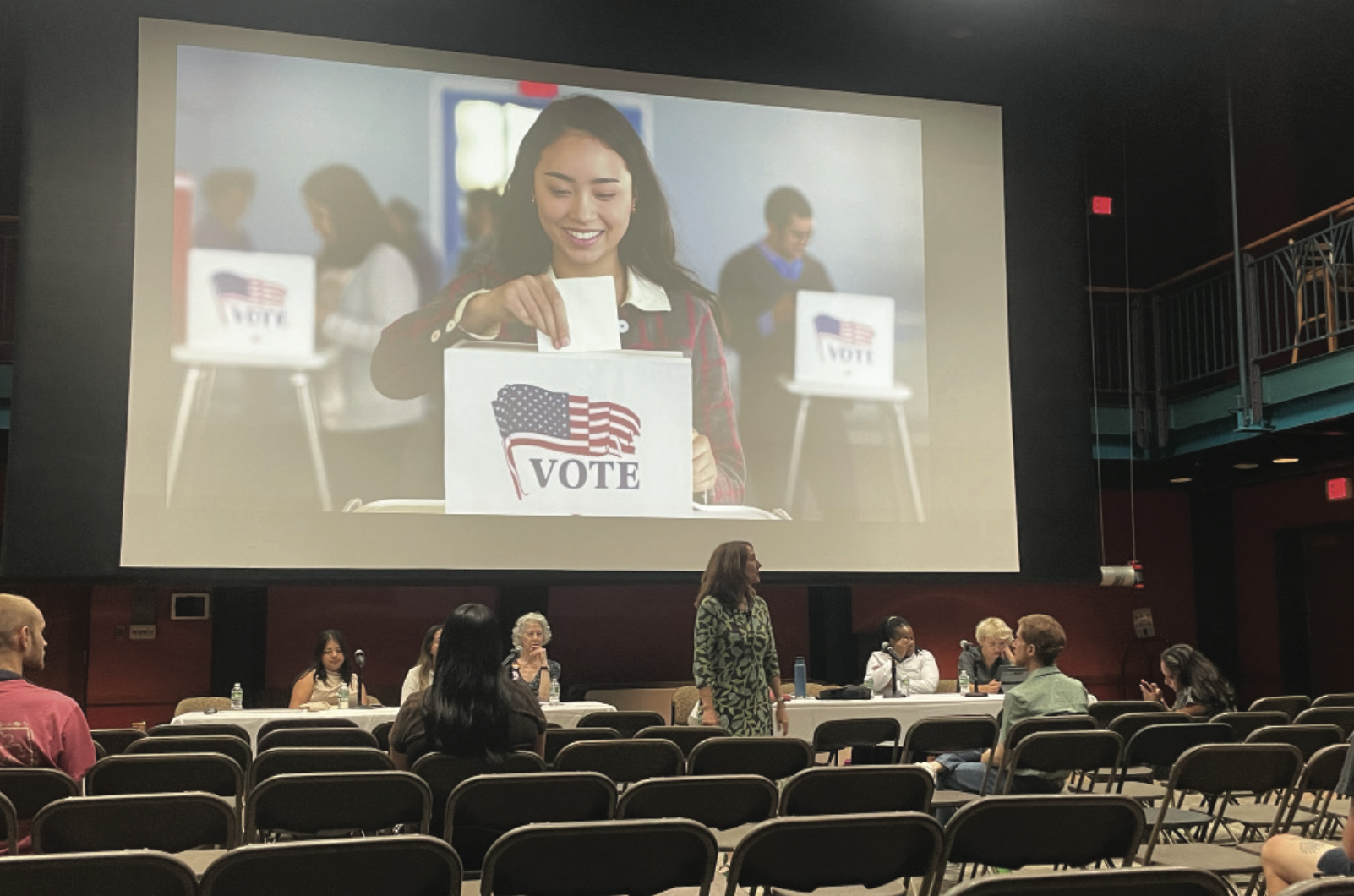SLU Holds Voter Panel Ahead of Elections
On Tuesday night in the Winston Room of the Student Center, the Andrew Goodman Foundation, alongside THELMO, held a panel on voting in the 2024 Presidential Election.
The panel was moderated by Dr. Kimberly Flint-Hamilton, and panelists included Dr. Zeyno Ustun, Dr. Precious Hall, Dr. Wendi Haugh, Natalia R. Singer, Kathleen Stein, Kimberly Bravo ’25, and Berenice Gervacio ’25.
The talk was kicked off by Dr. Zeyno Ustun, who discussed how the media is shaping the election. “It became a spectacle,” Ustun said, commenting on the recent presidential debate, and the many quips uttered by both candidates. Specifically, Ustun mentioned when Trump said Haitian immigrants are eating cats and dogs in Springfield, Ohio.
“It’s not amusing to make fun of their dietary habits,” Ustun said. “I don’t laugh at what white people choose to eat.” Ustun continued to speak about how these quips are designed to go viral but can also spread dangerous messages. “Propaganda has always been delivered in these ridiculous quips.” Ustan wrapped up by talking about the need to escape echo chambers and to be conscious of how algorithms shape our beliefs.
Later during the questions period, a student in the audience pushed back on Ustun. “Regarding what Trump said in the debate, I understand he was trying to make immigrants look bad, but I do have a fundamental issue with eating cats and dogs, I just wanted to push back,” Ustan replied. “Your push back shows Trump achieves what he’s going for, it’s not about culinary choice, it’s about dehumanization.” Ustan focused on the message being conveyed, rather than the actual consumption of pets by migrants. “The same applies to Palestinian lives, it’s about the person being dehumanized,” Ustan said.
Next was Dr. Hall, who focused on Gen Z, and their role in the Presidential election. “The percentage of Gen-Z voters in 2020 compared to 2016 as 11 percent higher, that means more and more of you are going to be voting,” said Hall. “And for you, your group cares a lot about social issues.”
Hall implored the audience, made up of Gen Z college students, to dig deeper than surface-level clips and spend time figuring out which candidate serves their interest, “We are counting on the youth to do things differently,” Hall ended her remarks with.
A student later asked, “I feel like I’ve lost hope for my community, I come from a lower income community and my own mother has become a Trump supporter, how can you have hope when your community has been misled?” In response, Hall emphasized the need to understand the other side of the aisle. “Not everything Trump says is a lie.” Hall continued. “When someone is making a choice you disagree with, try to understand why they are making that choice, try and empathize with them.”
Another student later asked the panel if they thought future elections would be more, or less divided given the current levels or polarization. Singer gave an admittedly biased reply, insinuating it was Trump’s ascendency within the Republican Party that has caused the deepening political split.
“It’s become MAGA, a lot of Republicans feel like they don’t have a home anymore. Republicans I know are trying to go back to the Republican Party they knew,” Singer said. “It used to be that there was more common ground both sides used to support the constitution and protecting democracy abroad.”
Dr. Wendi Haugh, an Andrew Goodman Foundation Faculty Champion, spoke about the AGF. The AGF is a non-partisan voter registration and encouragement organization. Their mission is, “to make young voices and votes a powerful force in democracy.”
“More and more young people are realizing the power of voting and taking action,” Haugh said. She concluded by explaining the resources the foundation provides, such as voter registration information, and rides to the polls on early voting days and election day.
Kathleen Stein, a member of the League of Women Voters for St. Lawrence Country, spoke about Ballot Proposal 1. Appearing on the same New York ballots for the presidential candidates, this proposal would prohibit government discrimination based on ethnicity, national origin, gender and other identities. “We need to protect against government discrimination,” Stein said. “You are shaping your world, your vote is your voice.”
The conversation shifted when Berenice Gervacio ’25 took the mic. “I haven’t felt safe on campus since last semester.” Gervacio said, referring to the Chalk for Palestine last Spring. “With this election, I feel like the discrimination is going to spike up.
She continued on by voicing her disagreement with Trump’s School Choice policy, using her own experience growing up in the Bronx, to support her belief in government-funded public schooling. “We don’t have the proper funds for an education, and without that it will be difficult to continue the resistance and revolution, especially against systems like capitalism and misogyny,” Gervacio concluded.
Kimberly Bravo ’25, the current President of THELMO, spoke about the impact Gen Z will have on this, and subsequent elections. “It’s up to us to ensure our voices are being heard and represented,” Bravo remarked. “For many of us, including myself, this is the first election we are voting in, we know what’s at stake.”
She encouraged her fellow students to actively engage with democracy and hoped that would translate to more engagement with campus politics. “I hope to see us all continue to be an active and more engaged campus this fall, and into the future,” Bravo said.



